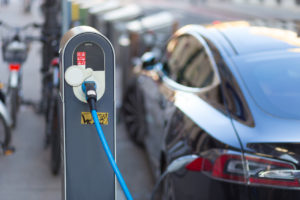As a result of taking a customer standpoint, the electrification of vehicle ownership envisaged by France’s Multi-Year Energy Program appears less a gradual evolution and more a genuine challenge. As a response to climate and other environmental issues, it sets some very ambitious goals for the transformation of France’s vehicle stock: 4.8m electric cars in private ownership by 2028. France’s Orientation des Mobilités (Future Direction of Mobility) legislation should provide some levers, but it’s still at the draft stage.
Beyond these legislative tools, this major transformation requires significant effort across the whole value proposition and involves a range of business sectors and public- sector players—at all levels.
Making electric vehicles a success: winning over customers and engaging the players
The transition from a purely combustion- based world to one centered on electric vehicles, or a mixture of different fuels , isn’t just about the electrification of the vehicle stock. To vehicles, the telegenic cheerleaders, add infrastructures and services, all regulated by a legal framework, and implemented by an ecosystem of private and public-sector players . At the end of this chain is the user—an individual or company—a player too often forgotten about in the transition to electric vehicles.
Offering services that demonstrate the value proposition
Today, electric vehicle development plans focus mainly on technical aspects: making the cars and putting in place a network of recharging stations. Although these are necessary, they aren’t sufficient: a change to the vehicle stock means taking into account sociological factors too. An entire ecosystem of services associated with the use of electric vehicles must be created—reassuring motorists, simplifying the user journey, and helping to disseminate information and build understanding about the system.
Engaging local authorities around the levers at their disposal

As a result of its closeness to both citizens in general, and electric-vehicle users, local governments are key to real transformation and play a particular role in making the transition socially acceptable and beneficial to all. Local authorities have a number of levers for developing electric vehicles, and three in particular seem especially relevant :
- Promoting the use of electric rather than traditional vehicles
- Managing the development of recharging infrastructure
- Mobilizing economic players through partnerships




